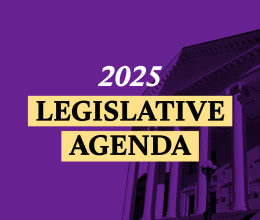McDonnell's Opposition to Executive Order Protecting Gays and Lesbians from Discrimination is Illogical and Contrary to Law
By David A. Drachsler, member of Board of Directors, ACLU of Virginia
It is distressing when clouded judgment and poor lawyering by a high government official leads him to conclusions that are clearly at odds with common sense, common decency and the law. But that is the only conclusion one can reach about the recent opinion of the new Attorney General of Virginia, Robert F. McDonnell, finding that it was unconstitutional for Gov. Tim Kaine to reaffirm an Executive Order issued by Gov. Mark Warner prohibiting discrimination in state government employment to the extent it proscribed discrimination on the basis of sexual orientation.
Attorney General McDonnell reached that conclusion for three main reasons:
1. The Governor has the authority to issue executive orders only to the extent such power is granted to him by the constitution and laws of Virginia, under his constitutional duty “to take care that the laws be faithfully executed.” No law grants the Governor the authority to prohibit discrimination based on sexual orientation.
2. The Governor has the authority to issue executive orders to meet a “genuine emergency.”
3. The governor has the authority to issue executive orders that are merely administrative in nature, which have been defined by the Virginia Supreme Court as those that are “temporary in operation and effect.”
Prohibition of discrimination on the basis of sexual orientation, the Attorney General concludes, meets none of these conditions and is therefore unconstitutional.
The third objection to this executive order is patently incorrect and easily disposed of. (There is no dispute that the emergency powers of the governor are not at issue here.) There are numerous executive orders of Virginia governors currently in force that do not have time limits and use the same language for their duration as the nondiscrimination executive order.
For example, Gov. Gilmore issued an executive order in 2000 establishing the “Commuter Choice Commuter Assistance” plan for Virginia state employees in the northern Virginia area, which provides a tax-free transportation fringe benefit to employees who use van pools or transit facilities- in other words, it expends state funds to give cash to employees to get them out of their cars. It provides that it “shall remain in full force and effect until superseded or rescinded by further executive action.” Gov. Gilmore relied on no more than Article V of the Virginia Constitution and his general powers as governor under the Code of Virginia as authority to issue this order.
Similarly, Gov. Warner established by executive order the Office of the Inspector General to “[c]onduct independent evaluations of the efficiency and effectiveness of programs and activities of state agencies. . . .” Gov. Warner also relied on his general powers and Article V of the constitution, and that executive order provided that it would “remain in full force and effect unless amended or rescinded by further executive order.” There has been no suggestion that these executive orders, which are not temporary in effect and operation, and which actually require the expenditure of public funds, are unconstitutional.
The Attorney General’s reasoning supporting the first objection is the most flawed and illogical. First, he ignores the basic statute explicitly granting the governor the authority to establish the policies and direct the administration of the government, and the statute establishing the personnel system of the Commonwealth, the Virginia Personnel Act.
The Code of Virginia states “[e] xcept as otherwise provided by the Constitution or law, the Governor shall have the authority and responsibility for the formulation and administration of the policies of the executive branch . . . ” and that “[t]he Governor shall be the Chief Personnel Officer of the Commonwealth.” The Virginia Personnel Act provides for “a system of personnel administration based on merit principles and objective methods of appointment, promotion, transfer, layoff, removal, discipline, and other incidents of state employment.”
It is these statutes which Gov. Kaine is faithfully executing. Dismissal, discipline or other adverse actions against government employees based on their sexual orientation has long since been rejected as a legitimate reason for government action, and would be in contravention of the policy of the General Assembly that all personnel actions in the Commonwealth be based on merit.
The further illogic in the attorney general’s reasoning is striking. He argues that the governor may not establish any nondiscrimination policy in state employment that goes beyond that already provided for in state law. He cites the example of Gov. Linwood Holton’s executive order in 1972 prohibiting discrimination against state employees on the basis of sex, age, race, religion, national origin, or political affiliation as being based on the 1972 Virginia Fair Housing Law which prohibited discrimination in housing based on race, color, religion or national origin. The attorney general does not explain how a housing discrimination law grants authority to the governor to prohibit discrimination in government employment.
Moreover, sex, age and political affiliation were not included in the 1972 version of the Fair Housing Law. Did not their inclusion in the governor’s executive order amount to policy making by the governor beyond the discrimination policy established by the general assembly, just as the attorney general claims Gov. Kaine has done by adding sexual orientation when it is not included in any current state law?



